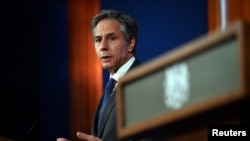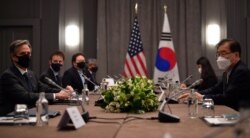The United States said it is ready to engage diplomatically with Pyongyang to achieve the ultimate goal of the denuclearization of the Korean Peninsula, following the completion of a months-long U.S. policy review on North Korea.
“What we have now is a policy that calls for a calibrated practical approach that is open to and will explore diplomacy with North Korea, to try to make practical progress that increases the security of the United States, our allies and our deployed forces,” U.S. Secretary of State Antony Blinken said Monday during a virtual joint press conference with British Foreign Secretary Dominic Raab in London.
Raab said the U.K. and the U.S. “share the strategic paradigm,” and both countries will support each other’s efforts.
On Friday, the Biden administration announced it completed the review of North Korean policy, expressing openness to talks with the reclusive communist nation. The U.S. is also expected to appoint a special envoy for North Korean human rights issues.
North Korea lashed out at the U.S. and its allies on Sunday in a series of statements, saying recent comments from Washington are proof of a hostile policy.
A statement by Kwon Jong Gun, head of the North Korean Foreign Ministry’s North America Department, warns that Pyongyang would seek “corresponding measures” and that if Washington tries to approach relations with Pyongyang through “outdated and old-school policies” from the perspective of the Cold War, it will face an increasingly unaffordable crisis in the near future.
“I hope that North Korea will take the opportunity to engage diplomatically and to see if there are ways to move forward toward the objective of complete denuclearization of the Korean Peninsula. And so, we'll look to see not only what North Korea says but what it actually does in the coming days and months,” the top U.S. diplomat added.
Blinken’s remarks follow his separate meetings with Japanese Foreign Minister Motegi Toshimitsu and South Korean Foreign Minister Chung Eui-yong, where the foreign ministers pledged U.S.-Japan-ROK trilateral cooperation toward the denuclearization of the Korean Peninsula.
Blinken arrived Sunday in London for meetings with his counterparts from G-7 nations, with the coronavirus pandemic, China and Russia high on the agenda, during three days of formal meetings and side discussions.
“We also discussed China. I think it's fair to say we see eye-to-eye on the need to stand up for our values, holding Beijing to the commitments that they've made, whether it's in relation to Hong Kong under the (Sino-British) Joint Declaration or wider commitments,” Raab said during Monday’s press conference.
He added that the U.S. and U.K. are also looking for constructive ways to work with China “in a sensible and positive manner” on issues including climate change when possible.
Senior U.S. officials had said it is not Washington’s purpose to try to contain China or to hold China down but to uphold an international rules-based order.
Biden has identified competition with China as his administration's greatest foreign policy challenge. In his first speech to Congress last Wednesday, he pledged to maintain a strong U.S. military presence in the Indo-Pacific and boost U.S. technological development.
Last month, Blinken said the U.S. was concerned about China's aggressive actions against Taiwan and warned it would be a "serious mistake" for anyone to try to change the status quo in the western Pacific by force.
Iran and North Korea, two nations whose nuclear programs have been the focus of negotiations in recent years, were set to be discussed at a working dinner Monday night.
Blinken’s other sideline meetings Monday included talks with Bruneian Foreign Minister II Dato Erywan Yusof and Indian Minister of External Affairs Subrahmanyam Jaishankar.
The G-7 ministerial talks are laying the foundation for a summit of leaders from those countries in June, also in Britain.
In addition to Britain and the United States, the G-7 includes Canada, France, Germany, Italy and Japan. Australia, India, South Africa, South Korea and Brunei are also taking part in this week’s talks.
After the G-7 meetings, Blinken is scheduled to travel to Ukraine to meet with President Volodymyr Zelenskiy and other senior government officials.
State Department spokesman Ned Price said in a statement that Blinken will “reaffirm unwavering U.S. support for Ukraine’s sovereignty and territorial integrity in the face of Russia’s ongoing aggression.”
(VOA's Chris Hannas contributed to this story.)






